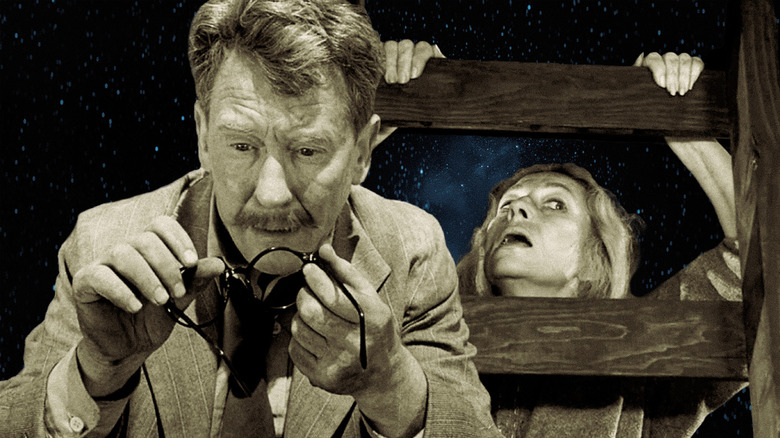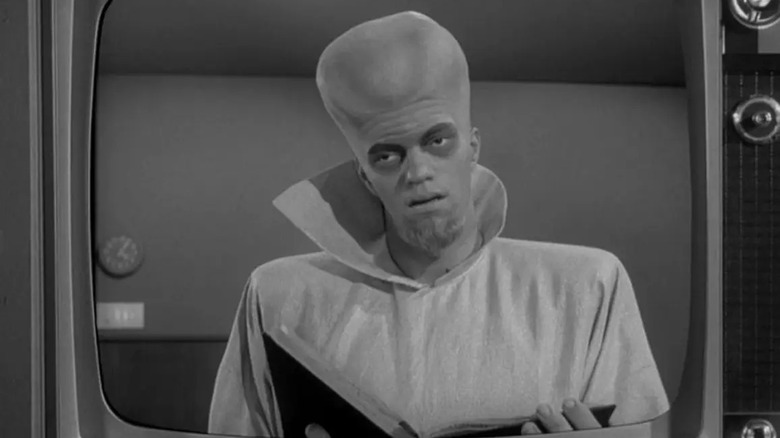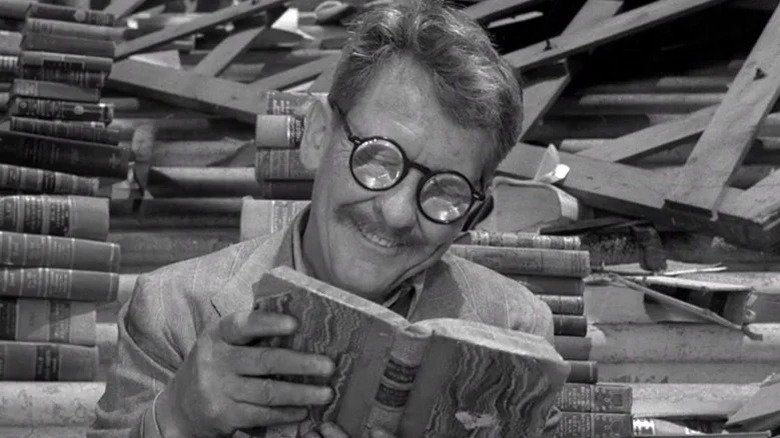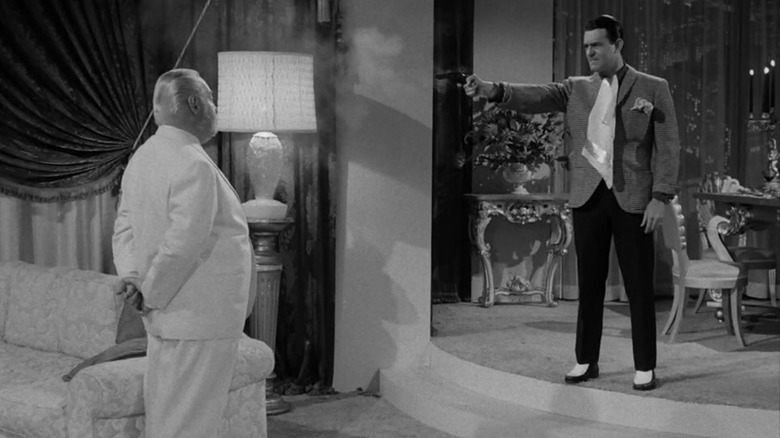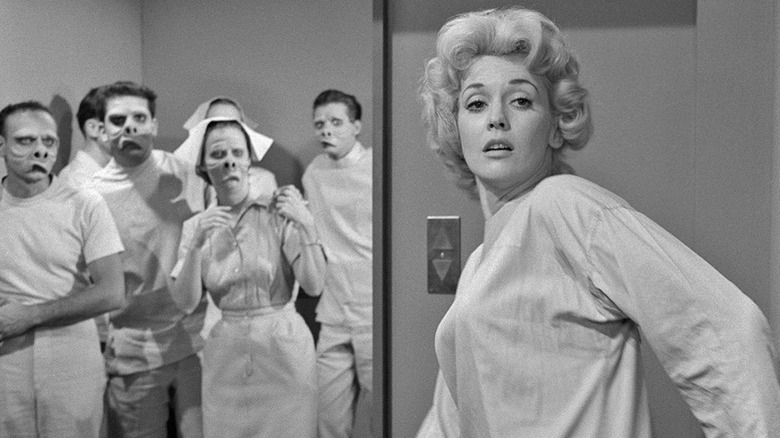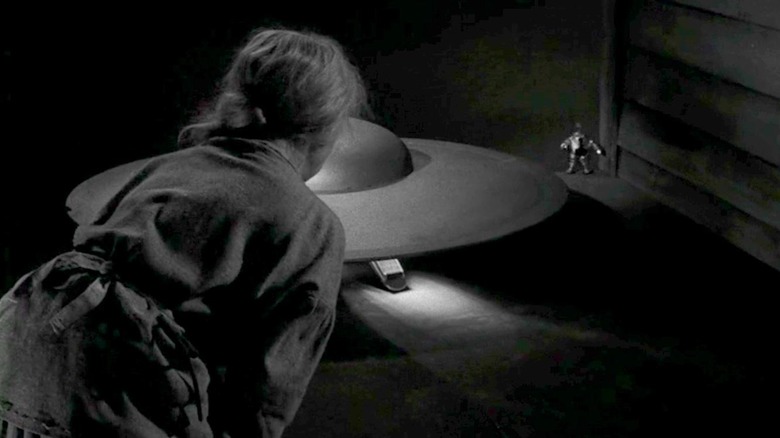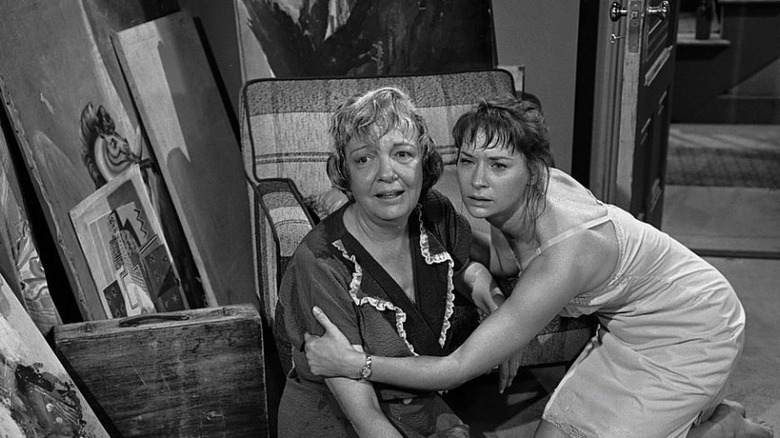The 6 Best Twist Endings In Twilight Zone History, Ranked
When people remember "The Twilight Zone," they usually talk about the endings. Certainly, the show's endings are the greatest fodder for parodies — from "Treehouse of Horror" on "The Simpsons" to "The Scary Door," a show-within-a-show in "Futurama."
As an anthology series, each venture into the Twilight Zone stands on its own terms and ends conclusively; the only consistent face is series creator Rod Serling as the narrator. The whole point of the series is to put its characters in bewildering circumstances, so twist endings were a way to wring out one last bit of shock. That's not to say the endings were all about shock value; the best twist endings in "The Twilight Zone" reflect the episode's message or leave the viewer with a new perspective on what they just watched.
Happy endings aren't an impossibility in "The Twilight Zone," but they aren't the ones that people remember. Here are the six endings that remain chilling to this day while casting a shadow over the series and speculative fiction at large.
To Serve Man
Let's get the obvious no. 1 out of the way first. "To Serve Man" boasts the most famous "Twilight Zone" twist ending. Its title is the home of the clever wordplay central to said twist. The episode, written by Serling himself (adapted from a short story by Damon Knight), is an unconventional alien invasion story, showing how conquerors sometimes come bearing carrots instead of sticks.
The invaders are the Kanamits (played by Richard Kiel), nine-foot-tall humanoids with bulbous heads (apparently indicative of larger brains) and telepathy. The aliens present themselves as humanity's friends, using their superior technology to end war and hunger. Translators led by Michael Chambers (Lloyd Bochner) decode the title of the Kanamits' guiding book, "To Serve Man," and all seems well. Patty (Susan Cummings) doesn't stop at the title, though, and learns the horrifying truth you probably already know: "It's a cookbook!" she warns Chambers, seconds too late to stop him from getting on a ship to the Kanamit homeworld.
The Kanamits have turned Earth into little more than a farm; after all, healthy cattle make for the best cuts of meat. Therein lies the terror of the episode: that mankind, masters of our Earthly domain, could become a lesser species and be treated the same way we treat cows and hogs. I wouldn't say the episode is meant as an indictment of farming, though. Rather, the message is a simple moral: always look a gift horse in the mouth.
Time Enough At Last
"Time Enough At Last" is the "Twilight Zone" episode that proves a twist doesn't have to be a sharp left turn. Henry Bemis (Burgess Meredith) is a bookish bankteller, despised by his peers for always havng his head up in the clouds or down in a book. All he wishes for is time to enjoy reading without other responsibilities (he's literally me!). Bemis gets his wish when the world is destroyed by hydrogen bombs — he survives because he was taking his lunch (and reading) break in the bank vault. After wandering about for a bit, he eventually reaches his local library and discovers plenty of books survived.
Stacking them in to-read piles for every month of the year, he sits down in delight that he has "time enough at last" for his passion. Then, before he can read a single page, he drops his reading glasses and they shatter. His delight turns to despair: "That's not fair. That's not fair at all. There was time now. There was all the time I needed..."
This episode, adapted from a Lynn Venable story, was also written by Sterling — it was his favorite episode in fact — and it's a tragedy worthy of the authors whom Bemis adored so much.
A Nice Place To Visit
I was raised Catholic. So, when I first discovered "The Twilight Zone" in middle school, the episodes that stuck deepest in my craw were the ones that pulled from Christian mythology; that's one reason that my favorite episode is "The Howling Man."
The other that always chilled me to my bones was "A Nice Place to Visit" (written by Charles Beaumont). Rocky Valentine (Larry Blyden), a small-time criminal, is shot during a robbery and awakens in the afterlife. The jolly Pip (Sebastian Cabot) guides him through a world where his every wish is fulfilled; the wealth and women he craved in life are at his fingertips. In no time at all, Valentine grows deathly bored.
In this apparent paradise, there are no challenges. Every gamble is a sure win, every woman falls over herself running towards him, and even if he went back to crime he'd evade punishment. Eventually, Valentine grows so desperate for a thrill he asks to be moved from Heaven to "the other place." Then Pip drops the friendly facade and a bombshell: "This is the other place!"
The censorship of "Hell" actually makes the line more effective, doubled by an abrupt music cue and Pip's mocking laughter at Valentine's horror. The twist may be last-minute, but it's well-foreshadowed and the ending is perfect in its abruptness. If you want a whole series' worth of this premise, there's now "The Good Place" too.
Eye of the Beholder
Here's another Serling-penned classic. "Eye of the Beholder" is the best-remembered "message episode" of "The Twilight Zone." Set in a hospital, the episode features a group of doctors and nurses discussing the fate of a disfigured patient, Janet Tyler (Maxine Stuart and Donna Douglas), whose face is hidden under bandages after her latest plastic surgery.
However, director Douglas Heyes hides everyone's visage; the hospital staff are shown only from behind or in heavy shadow. Then, the twist unfurls with Janet's bandages: she is a comely woman while the "normal people" are all pig-faced mutants. With the surgery unsuccessful, Janet goes off to live an isolated life with other members of "her kind."
The episode's title is of course taken from the famous aphorism, quoted in Serling's closing narration: "Beauty is in the eye of the beholder." In this world, though, the ugly face of imposed conformity is what's beautiful. The message is about more than just beauty standards though. This is a world where differences of any kind are not tolerated; a Hitler-esque dictator is shown broadcasting such a message on the hospital's televisions.
The show would explore the evil of enforced uniformity in later episodes (see Beaumont and John Tomerlin's "Number 12 Looks Just Like You") but the harmony of Serling's script and Heyes' direction means "Eye of the Beholder" made the deepest cut.
The Invaders
"The Twilight Zone" is always eerie, but "The Invaders" (written by Richard Matheson, directed by Heyes) is an outright horror story. A woman (Agnes Moorehead) in a quaint cabin finds a flying saucer landed on her roof and its two small inhabitants (indistinguishable due to their heavy spacesuits) begin stalking her through her home. Thanks to their small size, they can easily blend into the shadows and scenery, leaving Moorehead's character on her toes as she tries to flush out these invaders.
The episode is, in practice, a home invasion thriller and Heyes' direction gives it the suspense it deserves. Some have recently noted the episode feels like the precursor to this year's "No One Will Save You" (though director Brian Duffield denies direct influence); both that film and this episode feature protagonists with no dialogue. In "The Invaders," though, the silence is key to the twist.
One of the invaders makes it back to his ship and sends a warning message about a "race of giants." The woman smashes the ship and the camera pans down to reveal some writing on the hull: "U.S. Air Force Space Probe #1." In an instant, the episode flips the audience's perception — of course, Moorehead's character has no lines, for she doesn't speak any Earth languages — and makes them consider their sympathies. Humans are often invaders, but this time, the colonized have the power to fight back.
The Midnight Sun
We live on a boiling Earth; the last three years have seen the three hottest summers on record and climate disasters afflict every corner of the world. This is what makes "The Midnight Sun" even scarier and more biting decades later.
This episode (again written by Serling) is set in a world where the Earth has fallen out of its orbit and is hurtling toward the Sun. Before it gets there, its inhabitants will all die from drought or heat; the episode chronicles the last days before that happens. The leads are the artist Norma (Lois Nettleton) and her landlady, Mrs. Bronson (Betty Garde). They're holed up in their abandoned apartment complex, trying their best to stay cool in this endless scorcher.
This setting — a collapsed world order with a few survivors holed up in a barren city — makes "The Midnight Sun" feel like the first zombie apocalypse film (without the zombies). The scariest moment is when an unnamed man (Tom Reese) forces his way into the apartment building in search of water. Like later post-apocalyptic fiction, the real danger is what humans become when the law of the jungle reigns.
After Norma finally collapses and her paintings melt, the truth is revealed; it was all a fever-induced dream of hers. In fact, it's snowing outside and the Sun has set. "All just a dream" usually robs a story of meaning, but not here. It's revealed that the reality is the exact opposite of the initial premise; the Earth is actually moving away from the Sun and will freeze over. Norma, still delirious, talks about how "wonderful" the cold darkness is. Mrs. Bronson, wearing a thousand-yard stare, spares her the pain and agrees.
"The Twilight Zone" is streaming on Paramount+.
